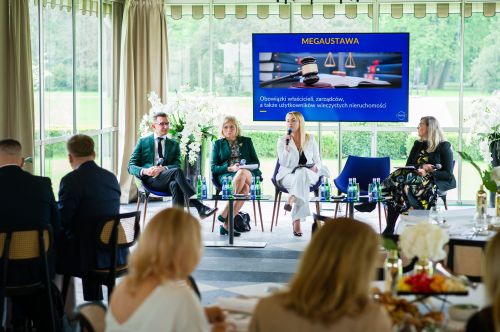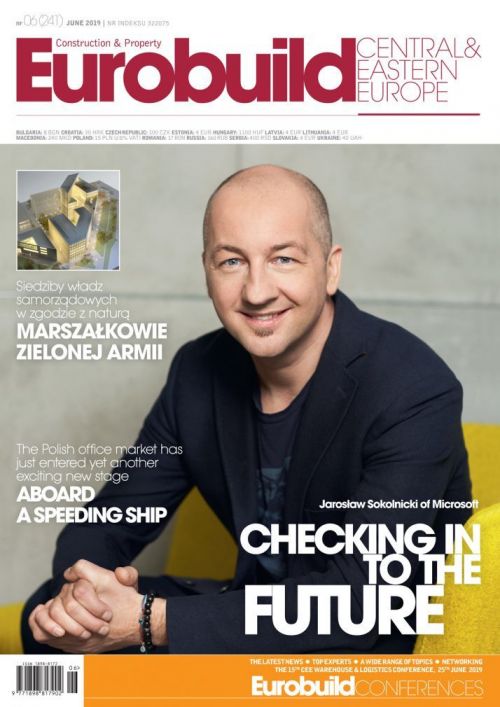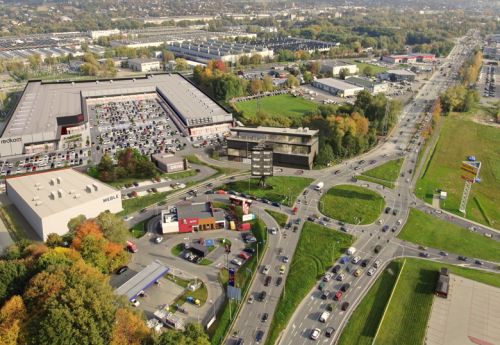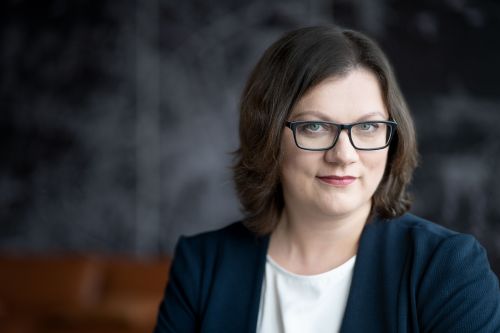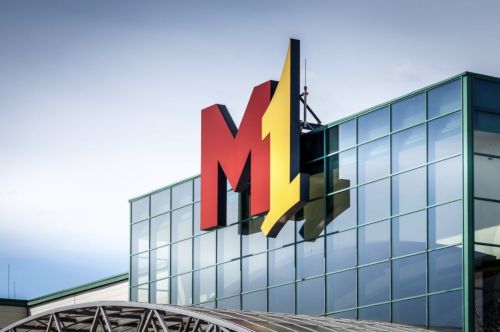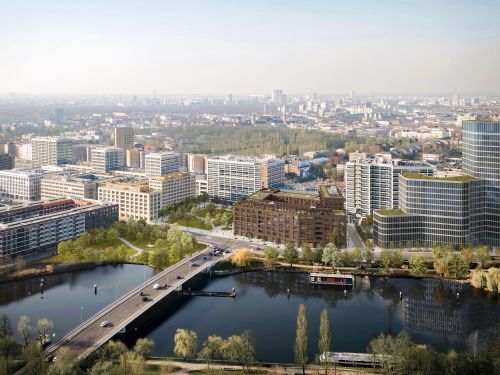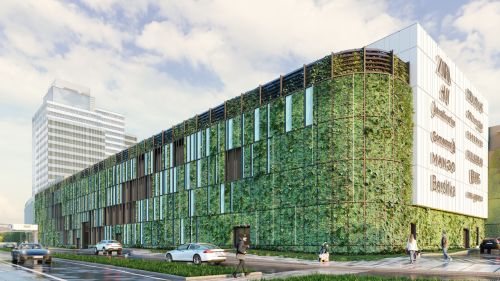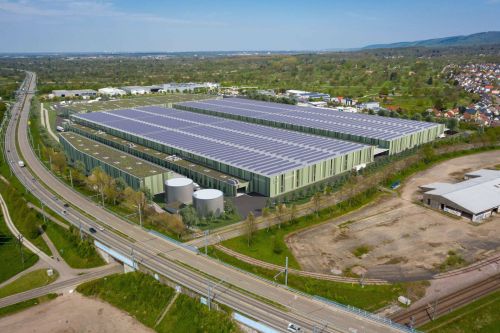Aboard a speeding ship
Office & mixed-use development
Krzysztof Misiak, international partner, head of office agency, Cushman & Wakefield Polska: How are you doing for time? It was mad in the office today and I haven’t had time to eat anything. So I’m inviting you for a late lunch. Is sushi ok?
[later]
Ewa Andrzejewska, ‘Eurobuild CEE’: When we entered the restaurant you immediately asked me if I wanted champagne so my first question is: what are we celebrating?
Krzysztof Misiak: I was just given a promotion about an hour ago.
Are you kidding – again? I wanted to ask you what it’s like to climb the ladder so fast in an organisation, because you have recently been promoted to director of the office agency – and now you’re telling me you’ve been given another promotion? What does your new title mean for you?
This is a new level in our structure that has replaced the equity partners we used to have, which in short means that I have a much greater range of responsibilities, but also greater opportunities for influence, in terms of other departments. I will no longer be dealing just with my business line. I can think not only about my country but also about other markets. It involves a kind of a greater commitment.
So what’s the next level you can reach in this corporation?
You’re asking what else I can do in this company? I think there’s a great deal. I do a lot of grassroots work. In the office agency we have a team of 52 people and realising their potential is the most interesting project that lies ahead of me. Our goal is to strengthen our position on the market and develop our team in terms of quality. A team of such a size – more than fifty people – is required for this scale of business, but certain processes need improvement so that we can spend more time with our clients. If we are talking about improving the quality, it’s worthwhile recalling that last year we added workplace strategy specialists to our office department in order to benefit from the synergies that this results in.
Now you manage more than 50 people, but you started at Cushman twelve years ago. That’s a long time...
That is true – this is my second major job. I previously worked in marketing and PR, and earlier than that on construction sites. I also walked dogs and I was occupied in various ways since as far back as primary school. So I started earning my own money quite early and I think this helped me to shape my character, learn respect for people and work – and to feel that independence is attainable. But my first few years in the real estate sector were difficult. You need to arm yourself with a long-term attitude when entering this field, to insulate yourself from unnecessary frustration.
But don’t such employers expect results now, immediately?
It depends. Even if we recruit people with extensive experience, we know that we shouldn’t expect spectacular results in the first year, because transactions are a long business process. Even if someone brings business on day one, around a year has to pass before the entire process can be successfully carried out. To feel comfortable in your role, you need at least five years of experience. Over my career, things have also changed. In my case, the catalyst was the opportunity to build something from scratch, that is, company branches in regional markets. This was not recognised field in the sector at that time. We were the first to create a separate function for a person responsible only for the regions. It was a case of to be or not to be for me, because I couldn’t be responsible just for Warsaw. That’s why I wanted to create a regular business out of it. For five years we operated from Warsaw, which meant a great deal of travelling on bad roads. Later, in 2012, we opened our first office in Kraków. My memories from that time are of establishing contacts at various events, where as a young, twenty-something boy I had to come to terms with my limitations and talk to experienced managers. It was a challenge. Another breakthrough occurred in 2015, when we managed to open other regional offices and expand the team. The most important thing was not to rest on your laurels and to make sure you remained fully engaged – the market really appreciates this. But back to the beginning: I’d just started work and it was 2008, and then... Lehman Brothers. So I quickly had to learn how to be resilient – 2009 was a very difficult time, many things didn’t work out, but my team and I never gave up. I was 24 years old and had inexhaustible reserves of stamina... unlike now [laughs].
Are you planning to open another office in the near future?
For now, we are still analysing such opportunities, but I hope that the market will allow us to do it at some point.
Do you like to come to the office, just sit at a desk and open your computer... or rather, as is the vogue these days, to sit in a café, stirring the pattern in the froth of a coffee prepared by a master barista? I’m asking about your style of working because I’m curious about your theories on how we will be working in a few years, in what kinds of offices or places.
When it comes to the future of the work environment, diversity is the most important factor. You will be able to choose how and where you want to work. The best companies will be those that can bring together all the generations under one roof. If you want the organisation to be inclusive, you can’t be oppressing your colleagues and imposing too much on them. I want to feel that the people I work with have good lives. However, they also have to see what they want and what the consequences of this are. I have streamlined the ‘home office’ rules so that people are now allowed to leave as often as they want and work from where they want, but not everyone wants to use this option. You have to remember that a home office is not an excuse for babysitting – and the team is aware of this. Looking at this more generally: we as advisors have to follow the clients. Increasingly often we join the team of a client that runs their business based on a different model, that has a different organisational culture. We are not advisors in suits and ties, who stand out from the other employees.
What will the office of a law firm be like in five years? Although this might be a bad example...
No, this is a very good example. In some offices you can now see a fetish for personal offices. It is a kind of status symbol.
But the lawyers in higher positions in the company will need a place to focus...
And other lawyers don’t need to? Besides, people in senior positions are often visiting their clients, in meetings, on business trips, at conferences, at lectures – and so their offices are often empty. I was recently talking to a few clients from this sector and I got the impression that they are beginning to understand the need for more flexible offices. This will certainly not be open space in the sense of a large hall with endless desks. And this is not how open space is being designed today, anyway. The word ‘zoning’ gives us a much better idea of how the office is evolving. Taking a broader look at this, when it comes to office layouts there will be more pressure on the developers and even more on the funds to get this right. Capital expenditures are increasing in this regard. Some buildings are being prepared for this, but what about those that are left behind?
Which ones are ready for the new reality?
Metropolitan, Rondo 1, the Warsaw Trade Tower and a few others. They have been adapted, but this still leaves them looking for a new identity. The word ‘prestige’ is becoming increasingly hollow. Will people who are 20 years old today be even that bothered about working in a prestigious building? You have to remember and understand one thing – their worldview will not shift as they age. They will not think like today’s thirty-year-olds. The younger generations, who have grown up in an era of prosperity, no longer have complexes that stem from lacking something in their childhood or youth. Their motivations are entirely different.
You mentioned earlier that things were not always rosy at work. What has been the most profound business lesson that you’ve had?
It was at the end of 2009 and early 2010, when every transaction was worth its weight in gold. Every thousand or two thousand square metres were vital. I learned then about the importance of the transparency of communication with each partner throughout the entire process. Everyone should have the opportunity to react. You cannot anticipate in advance the decision that someone will make. People and their emotions determine every transaction. I had to accept criticism from a few developers, but in retrospect it was a valuable experience. At that time I didn’t have the awareness needed to appreciate their point of view.
Are they still working with you?
Yes. You have to draw your conclusions and then move on to do your own thing.
Like operating in the regions. Which regional market is the hottest right now?
It changes every now and then. I don’t want to slap a crude label on anything. The Polish market is conditioned by two important factors: the significant dispersion of the large urban centres and the enormous potential of smaller cities and towns, because even if one medium-sized city doesn’t make much of an impression on its own, a dozen or so put together generate a significant mass. I think that, along with Kraków and Wrocław, Katowice and the TriCity that are both doing very well. The potential in Łódź will not be exhausted for some time, although it still needs to attract a few more investors. It also has to achieve a certain critical mass when it comes to the managerial staff. Poznań is growing at its own pace, but things are certainly far from boring there. Lublin and Szczecin, which are increasingly making their mark on the Polish office map, are also interesting examples, while even less developed centres are still waiting to be discovered and are likely to provide us with a great deal of work.
I see that you are looking at your watch, so let’s bring things to a close by talking about coworking. You represent WeWork so I don’t expect you to be entirely objective, but I will ask my question anyway because it’s such a fashionable topic. How long will coworking continue to enjoy such growth?
I’m sorry, I didn’t know that we were going to have an interview today and so I didn’t set aside quite enough time for this. But returning to your question, I think that the growth rate will begin to tail off. The largest operators will see how successful the process of selling their product, through membership, really is. Acquisitions of smaller operators are very likely. On the other hand, we are currently talking about coworking with every large client, so the interest is not diminishing. Our cooperation with coworking operators helps us manage changes in the staffing levels of the large corporations we advise. In conclusion, several new operators will certainly be making their entrance, but I’m not expecting the dramatic expansion rate we have seen recently to continue. They also have their next step ahead of them, which is entering the regions.
And what’s the biggest threat to the Warsaw office market?
In what time-scale?
One year or two years...
Then I can’t see any major threats for now.
And in the longer term?
In this case, you need to ask yourself what’s going to happen on the residential market. Will there be an end to the soaring construction costs fuelled by the residential sector? Because today it’s difficult for office developers to estimate execution costs, which has been hindering their growth. When it comes to the demand, human resources are a problem. If it is not possible to adapt the education system to the needs of investors, it could be difficult for new players to operate here. There is also the issue of investment funds and their willingness to buy. In order for a developer to be willing to build, they have to be sure of being able to exit from the investment. Fortunately, the data confirms Poland’s growing attractiveness among the largest funds - and they are ready to accept lower and lower yields, which is enabling developers to cover their margins.
Do you think this trend will continue?
We are very lucky to be living in Poland right now. A country rich in talent and with strong internal demand. We have also avoided centralisation. So we are a sturdy ship speeding on to new destinations, such as the regions with their huge potential – at least in the service sector. I think that is what really matters for the funds. We have interesting challenges ahead of us, but a market led by such cool-headed people will certainly be able to cope. ν
The rising star of C&W
Krzysztof Misiak has been employed by international consultancy Cushman & Wakefield since 2007 and has been a key member of its office agency team for more than twelve years. He has been responsible for successfully introducing the Cushman & Wakefield brand to the main regional Polish markets. In October 2018 he was appointed head of the office agency in Poland. Krzysztof has participated in more than 280 lease deals involving more than 475,000 sqm. His clients include such companies as Axa, Capgemini, State Street, Infosys, Kemira, Brown Brothers Harriman, Thomson Reuters, Takeda, Generali, Millennium Bank, Unilever, Deloitte, Citi, Bank Handlowy and UPC.













